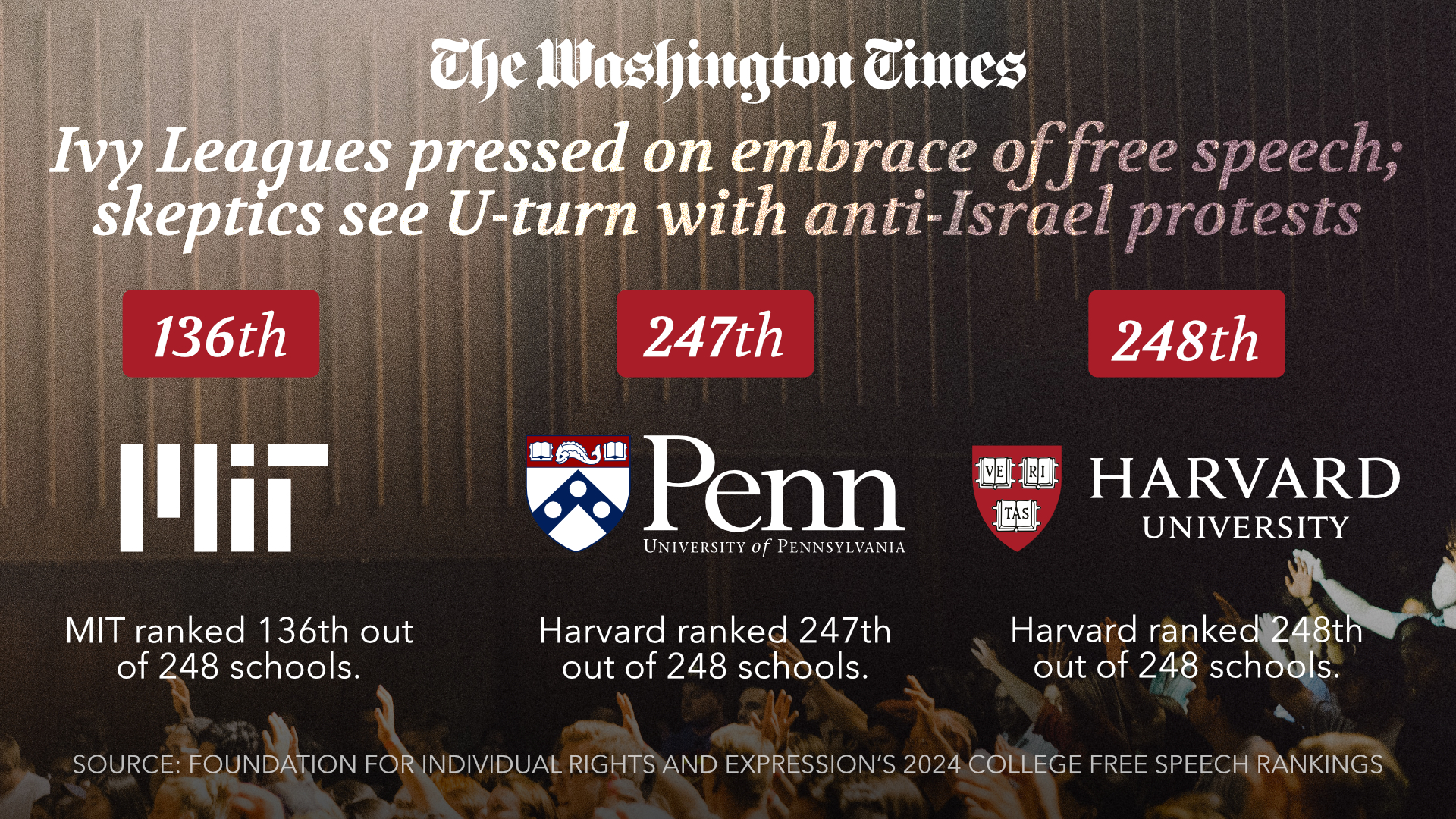A version of this story appeared in the Higher Ground newsletter from The Washington Times. Click here to receive Higher Ground delivered directly to your inbox each Sunday.
Harvard ranks dead last among universities when it comes to freedom of expression, which is why House Republicans had a hard time Tuesday swallowing President Claudine Gay’s free speech defense of anti-Israel and pro-Hamas demonstrations on campus.
Ms. Gay and other university presidents were called to testify on what House Republicans characterized as their First Amendment about-face as pro-Palestinian demonstrators champion Hamas and call for the end of Israel.
“We embrace a commitment to free expression and give a wide berth to free expression even of views that are objectionable, outrageous and offensive,” Ms. Gay said at the House Education and the Workforce Committee hearing on rising campus antisemitism.
House Republican Conference Chair Elise Stefanik, a Harvard graduate, fired back: “You and I both know that’s not the case.”
Ms. Gay, with University of Pennsylvania President Liz Magill and Massachusetts Institute of Technology President Sally Kornbluth, defended their responses to the anti-Israel activism in the aftermath of the brutal Hamas attack on Israeli civilians. They said they had taken action to combat antisemitism and ensure student safety.
Their defense of campus protesters’ First Amendment rights failed to impress Rep. Kevin Kiley, California Republican, who noted that Harvard ranked 248th out of 248 schools on the Foundation for Individual Rights and Expression’s 2024 College Free Speech Rankings.
Penn didn’t do much better at 247th. Harvard scored zero out of 100 points, although the school has disputed the scorecard and its methodology.

“And yet in the aftermath of Oct. 7, you’ve certainly become more outspoken about free speech than you were before,” Mr. Kiley said. “I don’t think there’s any doubt about that. You literally had the worst record, and it was only once chants of ‘globalize the intifada’ started disrupting classes and harassing students that you suddenly became a stalwart for free speech.”
Committee Chairwoman Virginia Foxx, North Carolina Republican, played a video of campus demonstrations where students chanted slogans such as “long live the intifada” and “intifada revolution,” referring to an armed uprising against Israel’s occupation of the West Bank and Gaza Strip.
Ms. Gay denounced such demands as “thoughtless, reckless and hateful” but said Harvard allows hateful speech unless it “crosses into conduct that violates our policies against bullying, harassment and intimidation.”
Ms. Stefanik, New York Republican, said the “intifada” declarations represent calls for the “genocide of Jews and the elimination of Israel” and noted that Harvard was less liberal-minded a few years ago when it rescinded acceptances for incoming freshmen over racist social media posts years earlier.
“A Harvard student calling for the mass murder of African-Americans isn’t protected free speech at Harvard, correct? Is that OK? Is that protected free speech?” asked Ms. Stefanik.
She quizzed the university presidents over whether “calling for the genocide of Jews” constituted bullying or harassment. Answer: It depends on the context.
Wow.
— House Committee on Education & the Workforce (@EdWorkforceCmte) December 5, 2023
Harvard, UPenn, MIT presidents would not give a straight answer to @RepStefanik’s question on whether calling for the genocide of Jews constitutes bullying and harassment against Jewish students. pic.twitter.com/wPJaVGw2eK
Ms. Gay said repeatedly that “there is no place for antisemitism at Harvard,” but Ms. Stefanik was unappeased.
“This is why I’ve called for your resignation, and your testimony today, not being able to answer with moral clarity, speaks volumes,” Ms. Stefanik said.
Not helping Ms. Gay’s defense was a Sunday post on X by Harvard graduate and billionaire hedge fund manager Bill Ackman, who listed anonymous comments from his conversations with faculty that included: “Years ago, Harvard stopped being a place where all perspectives were welcome.”
Ms. Magill and Ms. Kornbluth also condemned antisemitism but insisted their commitments to free speech tied their hands on student protests.
“Those who want us to shut down protest language are in effect arguing for speech codes,” Ms. Kornbluth said. “But in practice, speech codes don’t work. Problematic speech needs to be countered with other speech and with education, and we are doing that.”
Rep. Jim Banks, Indiana Republican, accused Penn of hypocrisy. He noted that the university canceled speakers after threats of protests and sought to punish Amy Wax, a tenured law professor, for allegedly racist and sexist comments.
“Ms. Magill, the fact is that Penn regulates speech that it doesn’t like,” Mr. Banks said. “Everyone gets this, no one more than the faculty and students who know exactly where the lines are that they’re OK to cross.”
The university presidents cited privacy concerns when asked whether they had taken any disciplinary action against students or professors who crossed the line from protected speech into inciting violence.
Democrats took shots at House Republicans’ proposed budget cuts to the Department of Education’s office for civil rights, which handles Title VI complaints against schools.
“You can’t have it both ways,” said Rep. Robert Scott of Virginia, the committee’s top Democrat. “You can’t call for action and then hamstring the agency charged with taking that action to protect students’ civil rights.”
The agency has opened investigations into more than a dozen schools, including Harvard and Penn, over antisemitism allegations.
• Valerie Richardson can be reached at vrichardson@washingtontimes.com.



![A gate opens to the Harvard University campus Dec. 13, 2018, in Cambridge, Mass. More than 30 Harvard University student organizations released a joint statement saying that the "Israeli regime [is] entirely responsible" for the surprise attack from Hamas that has killed hundreds of Israelis. (AP Photo/Charles Krupa, File)](https://twt-thumbs.washtimes.com/media/image/2023/08/14/Ivy_League_Preview_Football_47827_c0-85-3502-2126_s885x516.jpg?e3c9c4fc4f64f4450591ff8ed119ee88bce5b39b)
Please read our comment policy before commenting.